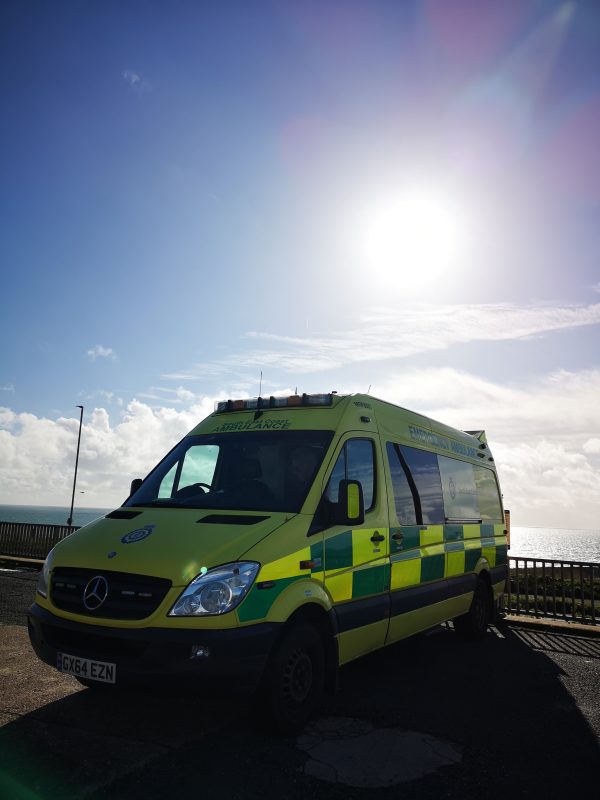 South East Coast Ambulance Service NHS Foundation Trust (SECAmb) is asking members of the public to take care in the sun as the UK starts to see the return of warmer weather.
South East Coast Ambulance Service NHS Foundation Trust (SECAmb) is asking members of the public to take care in the sun as the UK starts to see the return of warmer weather.
In previous years, the service has seen an increased demand in 999 calls relating to dehydration and heat stroke. On particularly busy days, it can handle more than 3,000 calls a day across the Kent, Surrey and Sussex regions.
Warmer weather can seriously affect people with long-term health issues such as heart conditions or high blood pressure, as well as older people and infants. These groups, and those who care for them, are urged to take particular care, and offer their support during the warmer weather.
People are reminded of the need to make use of alternatives to calling 999 when seeking help which isn’t an emergency including calling NHS 111 or using NHS 111 online at 111.nhs.uk for an assessment which will refer them to the most appropriate service available. People are also urged to speak to their own GP or to seek medical advice from pharmacists where possible.
Now is a great time to remind yourself of the simple, yet effective actions that can be taken to avoid the need to seek medical attention.
SECAmb’s tips for staying safe and cool in the sun
- Stay in the shade or indoors. The sun is at its most dangerous between 11am and 3pm. Find shade under umbrellas, trees or canopies.
- Use sunscreen and cover up. If you can’t avoid being out in the sun apply a high-factor sunscreen and cover up as much as possible, including wearing a hat.
- Increase your fluid intake. The normal recommended daily intake of fluid is 2.5 litres or 8 glasses per day. In extreme heat, experts recommend to drink more and varied fluids.
- Keep your home cool. Keep windows closed while the room is cooler than it is outside. Open them when the temperature inside rises, and at night for ventilation.
- Look after the elderly. Older people are more prone to the effects of heat. If you have older relatives or neighbours, you can help simply by checking on them and reminding them to drink plenty and often. Also help them to keep their house as cool as possible, using a fan if necessary.
- Protect children. Keep a close eye on young children and make sure they drink plenty of fluids. A good way to check if they are drinking enough is that they are passing urine regularly and that it is not too dark. You should check nappies regularly. Babies and the very young must be kept out of the sun.
- Act safely around water and follow lifeguard advice. Avoid excessive physical exertion. If you are taking physical exercise you need to drink half a litre of fluid at least half an hour beforehand and continue to replenish your fluids during and after exercising.
- Be sensible with alcohol. Hot weather speeds up the effects of alcohol so extra care should be taken when drinking. Alcohol will lead to dehydration so make sure that you alternate alcoholic drinks with water or fruit juice.
- Know the perils of outdoor eating. Warm summer weather is a perfect breeding ground for bacteria, so it is especially important to keep hot foods hot and cold foods cold until you are ready to eat them. When barbecuing always make sure you cook meat until it is piping hot, none of it is pink and all juices run clear.
When to call 999:
If you think a patient is suffering from one of the following you must dial 999 for an ambulance:
- Heart attack (e.g. chest pain for more than 15 minutes)
- Sudden unexplained shortness of breath
- Heavy bleeding
- Unconsciousness (even if the patient has regained consciousness)
- Traumatic back/spinal/neck pain
You should also call for an ambulance if:
- You think the patient’s illness or injury is life-threatening
- You think the illness or injury may become worse, or even life-threatening on the way to the hospital
- The patient needs the skills or equipment of the ambulance service and its personnel
Remember, heat stroke can be a killer. It can develop extremely suddenly and rapidly lead to unconsciousness. If you suspect someone is suffering from heat stroke, please call 999 immediately.
While waiting for the ambulance you should listen carefully to the call handler and follow the instructions given to you. The following can also help someone suffering from heat stroke:
- If possible, move the person somewhere cooler
- Increase ventilation by opening windows or using a fan
- Cool the patient down as quickly as possible by loosening their clothes, sprinkling them with cold water or wrapping them in a damp sheet
- If they are conscious, give them water or fruit juice to drink
- Do not give them aspirin or paracetamol
SECAmb Executive Director of Operations, Emma Williams, said: “Following what has been a rather gloomy and wet start to the year, I’m sure we’re all hopeful of enjoying some warmer weather.
We know, however, that hot weather can increase demand on our service, and we ask that everyone takes care, is sensible, and looks after those most vulnerable around them. We also need people to make use of alternatives to calling 999 if they’re not facing an emergency including speaking to a GP, pharmacist or using NHS 111 by phone or online for help and advice.”
“I would also like to take this opportunity to thank our staff and volunteers who have and continue to work so hard to respond to patients, especially in the warmer weather.”
